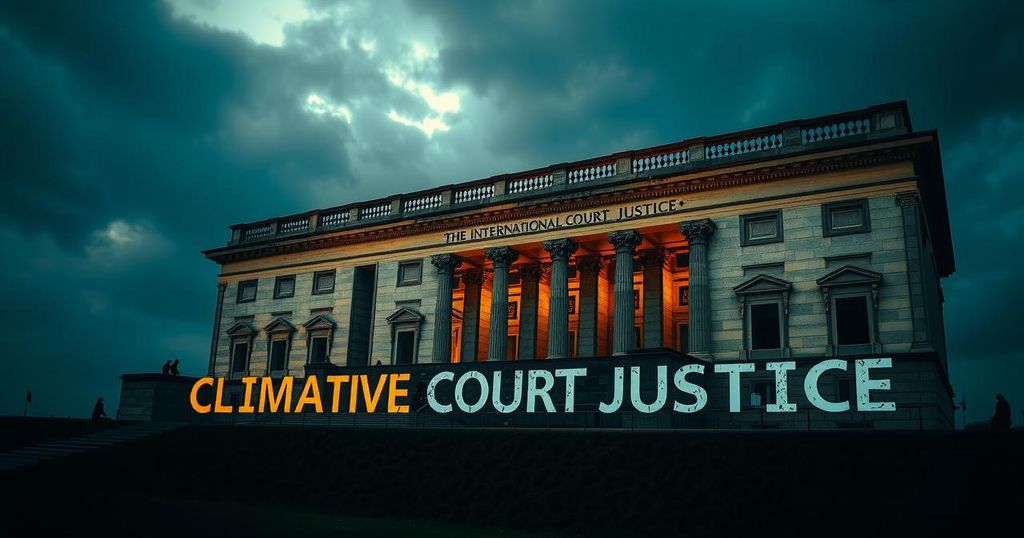Advancing Climate Justice through the International Court of Justice

The article discusses the importance of the International Court of Justice’s involvement in clarifying state obligations regarding climate change. Following a UN General Assembly resolution, the ICJ is set to provide an advisory opinion based on international law to hold states accountable for their climate actions. The outcomes are expected to significantly impact the global response to climate change.
The world faces a climate emergency marked by extreme weather events that increasingly jeopardize lives, livelihoods, and rights. Despite the awareness of the climate crisis, the states most accountable have not effectively addressed their obligations. The International Court of Justice (ICJ) is now playing a critical role in addressing these issues following the United Nations General Assembly’s request for an advisory opinion on state obligations concerning climate change. This process stems from the advocacy of Pacific Island nations and numerous global entities to clarify international legal responsibilities regarding climate action. On March 29, 2023, the UNGA unanimously adopted a resolution directing the ICJ to deliberate on the obligations of states relating to climate change. This advisory opinion is anticipated to provide significant legal clarity and emphasize the need for states to fulfill these obligations, thereby strengthening global climate justice efforts. The ICJ’s role is crucial, as the outcomes of its advisory opinion could hold states accountable for failing to protect people and the planet against climate impacts. The ICJ is set to address two primary questions: the obligations of states under international law regarding climate change and the legal repercussions for failing to adhere to those obligations. The clarity that the ICJ will provide is essential not only for guiding national and regional courts in their interpretations but also for galvanizing collective action toward climate justice. The timeline for the ICJ climate advisory opinion includes crucial dates such as the March 2024 written submissions and the December 2024 oral hearings, with a final opinion expected in 2025. The implications of a strong advisory opinion could transform the approaches of governments and industries towards climate resilience and accountability, offering a renewed opportunity for legal recourse against harmful practices. Moreover, the Center for International Environmental Law (CIEL) is actively involved, contributing legal insights and advocating for necessary procedural fairness throughout the ICJ process.
The article addresses the pressing issue of climate justice in the context of the International Court of Justice (ICJ). Given the global climate emergency characterized by devastating environmental impacts, there is an urgent need for clarification regarding international obligations of states concerning climate action. The involvement of the ICJ signifies a noteworthy legal progression that could enhance accountability and lead to strengthened climate policies. This process has seen substantial advocacy from various regions, notably the Pacific Islands, emphasizing the intersection of legal frameworks, human rights, and environmental protection.
In conclusion, the ongoing efforts at the International Court of Justice represent a pivotal moment for climate justice. The advisory opinion anticipated from the ICJ will seek to clarify state obligations under international law regarding climate change, which is essential for holding governments accountable. The outcomes of these proceedings have the potential to significantly influence national and international climate strategies, strengthening the legal mechanisms available to address the ongoing crisis and ensuring protection for vulnerable populations against climate harms.
Original Source: www.ciel.org






